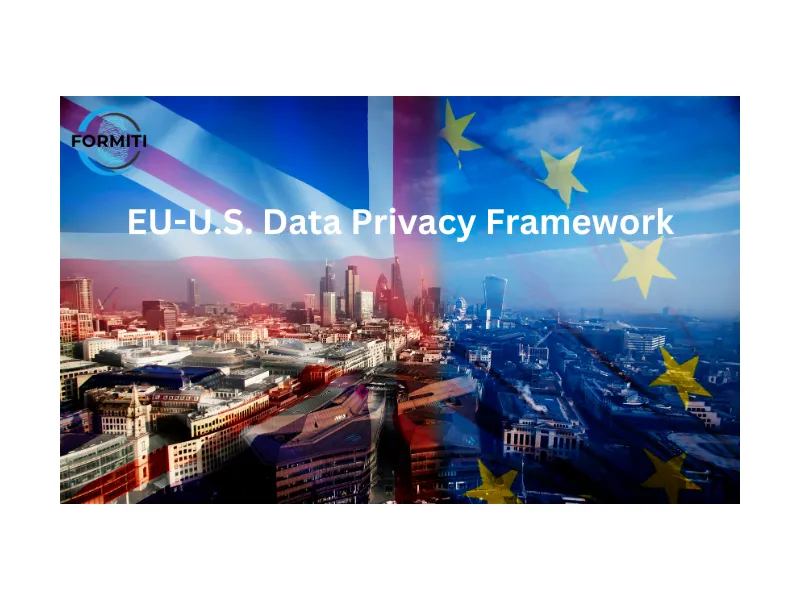Introduction
The introduction of the EU-US Data Privacy Framework (DPF) marks a significant shift in the landscape of international data transfers. This new framework, administered by the US Department of Commerce, ensures that US companies comply with stringent data privacy standards when handling data from the European Union, the United Kingdom, and Switzerland. Understanding the certification process is crucial for new applicants and companies transitioning from the old EU-US Privacy Shield. Here’s a comprehensive guide to help US companies Understanding The EU-US Data Privacy Framework Certification process.
For New Applicants
1. Understanding the DPF Principles
Organisations must commit to adhering to the DPF Principles for data transfers. This involves understanding the legal and ethical implications of data handling according to these principles. This requires specific text additions to your privacy notice/policy
2. Self-Certification and Annual Recertification
Companies must initially self-certify and then annually recertify their adherence to the DPF Principles to the International Trade Administration (ITA). This process involves a thorough internal review of data handling practices.
3. Compliance Obligations
Compliance with the DPF is not a one-time event but an ongoing obligation. Companies must ensure that their data handling practices align with the DPF Principles.
For Companies Previously Under the EU-US Privacy Shield
1. Updating Privacy Policies
Organisations must update their privacy policies to reflect their commitment to the “EU-US Data Privacy Framework Principles” and the “Swiss-US Data Privacy Principles.” This update must be more than nominal; it requires a substantive review and modification of the policy.
2. Deadline for Policy Updates
The updated privacy policies must be in place within three months of the effective date of the DPF Principles, i.e., by October 10, 2023.
3. Uploading Revised Policies
Revised privacy policies can be uploaded through the DPF website. However, there is no automatic review by the Department of Commerce, emphasising the importance of accuracy in self-assessment.
4. Enforcement and Compliance
The Federal Trade Commission (FTC) and other regulatory bodies will actively enforce compliance with the DPF. Companies must ensure their policies are updated and fully compliant to avoid investigations and fines.
5. Additional Rights for Data Subjects
The DPF grants data subjects additional options to enforce their rights or lodge complaints, further emphasising the need for companies to be diligent in their compliance efforts.
Information Required for the Application
1. Organisation Information
Provide the legal name and other essential details of the organisation.
2. Contact for Complaints
Designate a contact person for handling complaints and inquiries.
3. Corporate Officer
Identify the person responsible for completing the self-certification.
4. Company Entities and Subsidiaries
List all entities and subsidiaries involved in the data handling process.
5. Data Activities Description
Describe how your organisation handles personal data.
6. Independent Recourse Mechanisms
Detail the mechanisms in place for independent recourse in case of disputes.
7. Privacy Policy
New applicants must upload a draft privacy policy for assessment, while reapplicants should amend their existing policy to comply with the DPF.
8. Privacy Program Membership
List any privacy programs the organisation is a member of.
9. Verification Method
Choose between self-certification or an outside compliance review.
10. Organisational Details
Provide annual turnover.
11: Employee Numbers.
Provide the number of employees of organisation and all entities and subsideries
Warning
Entering into Data Processing Contracts between EU/UK/CH – US companies that include DPF references without being certified can Invalidate those contract terms and could result in large fines and penalties.
Conclusion
The EU-US Data Privacy Framework presents both a challenge and an opportunity for US companies dealing with transatlantic data transfers. By understanding and adhering to the DPF Principles, companies can not only avoid legal pitfalls but also demonstrate their commitment to protecting consumer data. Whether you are a new applicant or transitioning from the Privacy Shield, it is essential to approach this process with diligence and a thorough understanding of the requirements.
In Need of urgent help?
Contact Formiti Data International for a fixed price fast turnaround Privacy Policy/Notice DPF compliant update or any further assistance. Click Here

